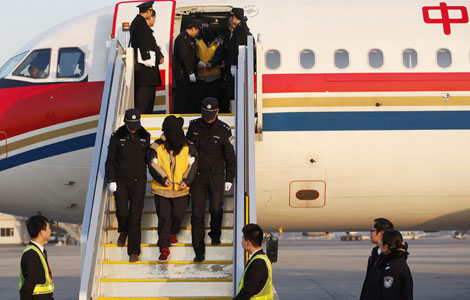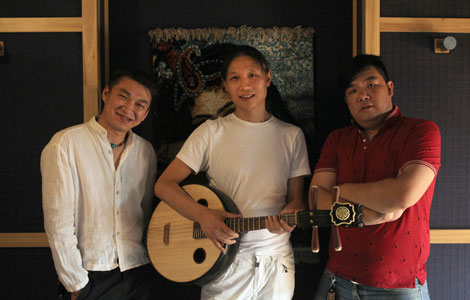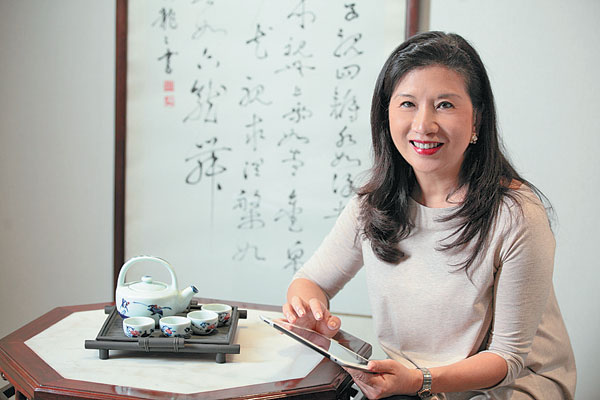Cutting your cloth to suit your style
Updated: 2013-09-26 07:13
By Huang Ying (China Daily)
|
||||||||
Textile company boss defies declining trend with unique approach to business
Regarding one of China's most traditional industries - textiles and apparel - Marjorie Yang Mun-tak holds quite different a view in comparison with mainstream opinion that it is a declining industry with no future.
"There are no sunrise industries or sunset industries. The point lies in how people run these industries," said Yang, chairwoman of Hong Kong-based Esquel Group, one of the world's leading manufacturers of premium cotton shirts, boasting well-known customers including Tommy Hilfiger, Hugo Boss AG, Nike Inc and Ralph Lauren Corp.
Born to a textile family, in which both her maternal grandfather and father were engaged in textile manufacturing and trading, Yang's father Yang Yuan-loong declined to encourage her to continue in the family business at first, saying it was very tough work.
|
People shopping in a PYE store in Hong Kong. PYE is a retail brand of Esquel Group. Provided to China Daily |
However, not only did the young Yang inherit the family business, but she made it a great success while others dismissed it as a sunset industry.
In 1995, Yang officially took the helm of Esquel Group, which was founded by her father in 1978 some 26 years after her birth.
Yang, who has a bachelor of science degree in mathematics from Massachusetts Institute of Technology and an MBA degree from Harvard Business School, brought new ideas into corporate management, far different from her father's ways.
Immediately after assuming the post of Esquel Group's chairman, she came up with several new proposals and endeavored to have them put in place despite facing a variety of difficulties.
These proposals included setting up a new plant in Xinjiang Uygur autonomous region, investing in the improvement of local extra long-stapled cotton seeds - cotton with relatively long fibers - and introducing new scientific technologies and ideas in company management.
Esquel Group's annual revenue more than doubled from $530 million in 2006 to $1.2 billion in 2012, a year when the producer made more than 100 million shirts for its high-end customers.
In the same year, Yang ranked in Forbes' list of Asia's 50 Power Businesswomen and, in addition to that, she entered the list of the richest businesswomen and is frequently on the list of most-successful female entrepreneurs.
While most apparel and textile enterprises complain about depression in the industry, Esquel Group speaks a different language.
Chen Haiying, chief representative of Esquel Group's Beijing office, said the orders from their clients pour in even to the extent they have difficulty in handling all of them in time.
The sluggish market for textile companies in general is caused by a number of factors, such as rising labor costs, a heavy burden of taxes and fees and the appreciation of the yuan.
"At a time of crisis, branded companies won't give their orders to a company that might close down tomorrow," said Jiang Hui, chairman of China Chamber of Commerce for the Import and Export of Textile and Apparel.
This explains why textile giants such as Esquel Group and Luthai Group maintain growth - they are big enough to be relied on.
The secrets behind Esquel Group's vigorous performance have a lot do to with its commitment to productivity gains and environmental protection.
"Esquel's annual investment in energy saving and environmental protection amounts to 30 million yuan," said Cheng Peng, general manager of Esquel Group's knitting factory in Guangdong.
In 2012, the shirt manufacturer made a breakthrough in textile wastewater treatment, reusing reclaimed water in the production process.
Because the practices of sustainable development can be found in all production processes within Esquel Group, over the past five years, in terms of producing each shirt, energy consumption has been cut by almost 40 percent and water consumption has been curtailed by 50 percent, according to Cheng.
One of the latest practices that contributes to sustainable development is Esquel's internal information technology development - that includes the mobile application of a self-service salary-checking system.
According to legal requirements, a piece of paper indicating the details of employees' monthly salaries should be put into their hands. Because Esquel has large operations globally, with a total workforce of 55,000 employees, the cost of manpower and paper was huge. An electronic salary sheet was officially put into practice in March, allowing employees to check the details of their salary anytime they want by logging on to the application using their mobile phones.
"It helps save paper resources and brings about convenience and more privacy for employees in checking their salaries," Cheng said.
So far, the application has been developed in three languages - Chinese, English, Vietnamese and the Uygur dialect.
"Some of our green dedication is not so visible now, but it's estimated it will take effect within three to five years," said Yang.
By way of example, she said lids at the sewage treatment facility in Esquel's factory in Gaoming in Guangdong province help to reduce energy consumption and odor emissions during the cleansing process.
In the long run, this considerate move for nearby residents might attract more people to settle in the city, thus bringing in more labor and improving its reputation in the field of environmental awareness, which are considered to be good for the company's reputation.
Another reason for Esquel's rosy performance over the years is what Yang called "our own set of competitive advantages over rivals".
While most rivals in the textile and apparel sector spare no effort in cutting labor costs or transferring factories to countries where labor is cheaper than in China, Yang said she's optimistic about China's coastal regions' attractiveness for the manufacturing business of Esquel Group.
For example, many manufacturing enterprises have moved to Southeast Asian nations such as Bangladesh and Cambodia. However, Yang thinks Guangdong is more competitive than them with regard to the quality of the labor force.
After a fire broke out in a fashion factory in Dhaka, Bangladesh, in November, killing at least 117 people and injuring at least 200, Yang said: "Our orders witnessed a considerable increase".
The accident is believed to be the deadliest factory fire in the nation's history. "Production efficiency is what we value most instead of unit labor cost," she said.
In order to increase productivity, Esquel has shifted its management emphasis from labor input to the cultivation of its labor force.
"When it comes to management, nothing is small business," she said.
Young people such as her daughter usually offer a different perspective in looking at problems.
Yang's daughter Dee Poon, who also graduated from Harvard University and now serves as CEO of PYE, the retail brand of Esquel Group, once studied the relation between the female workers' attendance rates and the rate of unplanned pregnancies.
"Once a female worker gets pregnant unexpectedly, there would be a significant number of days that she would be absent from her position." Yang said. "When such cases happen several times, the factory's total production capacity suffers tremendously, especially in an industry in which the majority of workers are female."
In response to this issue, the company provides training classes on contraception to female employees who have limited knowledge of avoiding unplanned pregnancies.
"It works well and the situation has changed in the interests of the company," Yang said. "Enterprises in the traditional industries have to reform," she added.
When talking about the biggest challenge facing the textile sector, she said: "It's about how to get employees to accept new management thoughts in this era in this industry and to allow staff to give full play to their potential and creativity".
Yang said she likes pointing out her employees' areas for improvement in person "relentlessly" before subsequently offering advice.
The thought of retirement has crossed Marjorie Yang's mind, but she said that she still prefers to work, which brings her much more vitality and fun.
In her leisure time, Yang likes playing table tennis, tai chi chuan (a kind of traditional Chinese shadow boxing) and yoga.
"It is the best of times for entrepreneurs like me because the idea of building the nation by engaging in industry' can finally be realized now, a factor that stems from my maternal grandfather," said Yang.
huangying@chinadaily.com.cn
|
Marjorie Yang Mun-tak, chairwoman of Hong Kong-based Esquel Group. |
(China Daily USA 09/26/2013 page16)

 Djokovic announces engagement to girlfriend
Djokovic announces engagement to girlfriend
 Taipei, LA and Singapore top travel search growth list
Taipei, LA and Singapore top travel search growth list
 Big cats are part of the family
Big cats are part of the family
 Arm exhibition at Russia Arms Expo 2013
Arm exhibition at Russia Arms Expo 2013
 Rubber duck adjusting to spot at Summer Palace
Rubber duck adjusting to spot at Summer Palace
 Suspects in financial offenses arrested in SE Asia
Suspects in financial offenses arrested in SE Asia
 China champs at the bit
China champs at the bit
 Echoes of China
Echoes of China
Most Viewed
Editor's Picks

|

|

|

|

|

|
Today's Top News
Ministry welcomes WTO poultry ruling against US
Xi reaffirms education top priority
China, Russia issue joint statement on Syria
China to improve policies for overseas investment
Airbus scores in China with $6b in deals
Concern about environment grows
Rich should fight poverty too: Ho
Li Tianyi jailed for 10 years for gang rape
US Weekly

|

|






